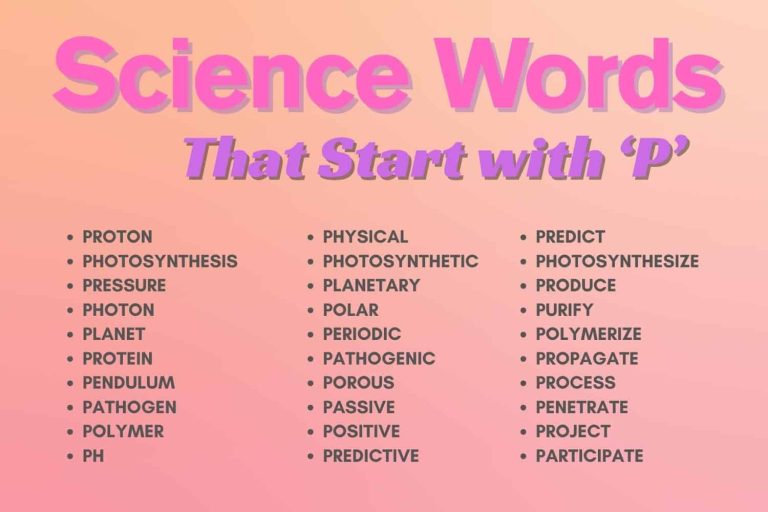50+ Science Words That Start With D: Definition & Meaning
Science, with its intricate vocabulary, can often feel like learning a new language. This is especially true when encountering specialized terms that begin with a specific letter, like “D.” Understanding the grammatical function of these words is crucial for accurate scientific communication and comprehension.
From fundamental concepts like “data” and “density” to more complex terms such as “diffusion” and “DNA,” this exploration will empower you to use these words with confidence and precision. We’ll cover nouns, verbs, adjectives, and adverbs, providing clear examples and practical exercises to solidify your knowledge.
This article delves into the grammatical roles of scientific terms starting with “D,” exploring their definitions, structural use, and common pitfalls. Whether you are a student, researcher, or science enthusiast, this comprehensive guide will enhance your understanding and application of these essential terms.
Definitions of Science “D” Words
Understanding a word’s definition is the first step in mastering its grammatical function. In science, many words beginning with “D” have precise meanings that are essential for clear communication.
Depending on the context, these words can function as nouns, verbs, adjectives, or adverbs. This section defines some of the most common science-related “D” words, providing a foundation for understanding their grammatical roles.
Let’s explore some key definitions. Data refers to facts and statistics collected together for reference or analysis. Density is the degree of compactness of a substance. Diffusion is the spreading of something more widely. DNA (Deoxyribonucleic acid) is a self-replicating material present in nearly all living organisms as the main constituent of chromosomes.
Dissection is the act of cutting something open for investigation. These definitions are just a starting point, and we will delve deeper into their specific usages and grammatical functions in the following sections.
Examples of Science “D” Words in Sentences
To solidify your understanding of science “D” words, let’s examine numerous examples of their usage in sentences, categorized by their grammatical function. These examples will illustrate how these words function in context and how they contribute to the overall meaning of the sentence.
Noun Examples
Nouns are words that represent people, places, things, or ideas. In science, many “D” words function as nouns, representing fundamental concepts, objects, or processes.
For example, “data,” “density,” “diffusion,” “DNA,” “dissection,” “diagnosis,” “diode,” “decibel,” “derivative,” and “dilution” are all nouns. These words can be singular or plural, concrete or abstract, and can function as subjects, objects, or complements within a sentence.
The following table provides examples of science “D” words used as nouns in sentences. These examples cover a range of scientific disciplines and illustrate the diverse contexts in which these words can be used.
| Sentence | “D” Word | Scientific Field |
|---|---|---|
| The data was collected over a period of six months. | Data | Statistics |
| The density of the metal is crucial for its application. | Density | Physics |
| Diffusion is a key process in cellular transport. | Diffusion | Biology |
| DNA holds the genetic code for all living organisms. | DNA | Genetics |
| The dissection revealed the extent of the damage. | Dissection | Anatomy |
| An accurate diagnosis is essential for effective treatment. | Diagnosis | Medicine |
| The diode regulates the flow of current in the circuit. | Diode | Electronics |
| The decibel measures the intensity of sound. | Decibel | Acoustics |
| The derivative of the function represents its rate of change. | Derivative | Mathematics |
| The dilution of the solution is necessary for accurate measurements. | Dilution | Chemistry |
| The scientist analyzed the decay of the radioactive isotope. | Decay | Nuclear Physics |
| The patient showed signs of cognitive decline. | Decline | Neurology |
| The experiment aimed to measure the rate of decomposition. | Decomposition | Environmental Science |
| The deficit in the budget impacted research funding. | Deficit | Economics |
| The definition of the term was crucial for understanding the concept. | Definition | Philosophy of Science |
| The study examined the degradation of the polymer over time. | Degradation | Materials Science |
| The forest experienced significant deforestation. | Deforestation | Ecology |
| The delay in the signal caused errors in the communication. | Delay | Telecommunications |
| The demand for renewable energy is increasing. | Demand | Environmental Economics |
| The demographic data revealed trends in population growth. | Demographic | Sociology |
| The deposition of sediment formed the new landmass. | Deposition | Geology |
| The depth of the ocean at that point is 10,000 meters. | Depth | Oceanography |
| The design of the experiment was carefully planned. | Design | Experimental Science |
| The destiny of the universe is a topic of much debate. | Destiny | Cosmology |
| The detection of gravitational waves confirmed the theory. | Detection | Astrophysics |
| The detergent cleaned the lab equipment effectively. | Detergent | Chemistry |
| The device measured the temperature accurately. | Device | Engineering |
| The diagram illustrated the process clearly. | Diagram | Scientific Communication |
| The diameter of the circle is 10 cm. | Diameter | Mathematics |
Verb Examples
Verbs are words that express actions, occurrences, or states of being. While fewer science “D” words function primarily as verbs, many can be verbified, or used as verbs in specific contexts.
Examples include “debug,” “degrade,” “denature,” “deposit,” “detach,” “determine,” “develop,” and “differentiate.” These verbs describe actions or processes that occur within a scientific context.
The following table provides examples of science “D” words used as verbs in sentences. These examples demonstrate how these words can be used to describe actions and processes in various scientific contexts.
| Sentence | “D” Word | Scientific Field |
|---|---|---|
| The programmer had to debug the software. | Debug | Computer Science |
| The plastic will degrade over time. | Degrade | Materials Science |
| High temperatures can denature proteins. | Denature | Biochemistry |
| Sediments deposit on the ocean floor. | Deposit | Geology |
| The cell must differentiate to become specialized. | Differentiate | Biology |
| The scientist aimed to determine the cause of the disease. | Determine | Medical Research |
| The children developed a new understanding of the concept. | Develop | Education |
| The researchers detached the sensor from the device. | Detach | Engineering |
| The system is designed to detect even the faintest signals. | Detect | Signal Processing |
| The investigation demonstrated the validity of the hypothesis. | Demonstrate | Scientific Method |
| The company decided to deploy the new technology. | Deploy | Technology |
| The chemical will dissolve in the water. | Dissolve | Chemistry |
| The team worked to design a more efficient engine. | Design | Engineering |
| The speaker sought to describe the complex phenomenon. | Describe | Scientific Communication |
| The experiment aimed to destroy the bacteria. | Destroy | Microbiology |
| The new regulations will deter pollution. | Deter | Environmental Science |
| The drug is designed to detoxify the body. | Detoxify | Pharmacology |
| We need to develop a better understanding of the issue. | Develop | Research |
| The model can diagnose the problem accurately. | Diagnose | Artificial Intelligence |
| The scientist had to disassemble the machine. | Disassemble | Mechanical Engineering |
| The program will download the files automatically. | Download | Computer Science |
| The company plans to diversify its investments. | Diversify | Economics |
| The study sought to document the changes over time. | Document | Research |
| The government aims to dominate the market. | Dominate | Economics |
| The seeds will dorminate until the conditions are right. | Dorminate | Botany |
| The project seeks to double the output. | Double | Production |
| The team had to draft a new proposal. | Draft | Project Management |
| The river will drain into the ocean. | Drain | Hydrology |
| The data was duplicated for backup purposes. | Duplicate | Data Management |
Adjective Examples
Adjectives are words that describe or modify nouns, providing more detail about their qualities or characteristics. Science “D” words that function as adjectives include “dense,” “diffuse,” “distal,” “dormant,” “dominant,” “dynamic,” “degradable,” “deterministic,” and “deductive.” These adjectives add specificity and precision to scientific descriptions.
For example, in the phrase “dense material,” the word “dense” is an adjective modifying the noun “material.” Similarly, “diffuse light” uses “diffuse” as an adjective. Adjectives are crucial for providing detailed and accurate descriptions in scientific writing and communication.
| Sentence | “D” Word | Scientific Field |
|---|---|---|
| The dense forest absorbed most of the sunlight. | Dense | Ecology |
| The diffuse light made it difficult to see clearly. | Diffuse | Optics |
| The distal end of the bone is connected to the joint. | Distal | Anatomy |
| The seeds remained dormant until spring. | Dormant | Botany |
| The dominant species in the ecosystem is the oak tree. | Dominant | Ecology |
| The system is very dynamic and changes rapidly. | Dynamic | Systems Theory |
| The degradable plastic is better for the environment. | Degradable | Environmental Science |
| The model is deterministic and always produces the same result. | Deterministic | Mathematics |
| The scientist used deductive reasoning to reach a conclusion. | Deductive | Logic |
| The material has a durable construction. | Durable | Materials Science |
| The damaged equipment was taken out of service. | Damaged | Engineering |
| The dangerous chemical requires special handling. | Dangerous | Chemistry |
| The dark matter is invisible to the human eye. | Dark | Physics |
| The decaying wood provided nutrients to the soil. | Decaying | Ecology |
| The decentralized system is more resilient to failures. | Decentralized | Computer Science |
| The deceptive data misled the researchers. | Deceptive | Statistics |
| The deciduous trees lose their leaves in the fall. | Deciduous | Botany |
| The dedicated server handles the high traffic. | Dedicated | Computer Science |
| The deep sea is largely unexplored. | Deep | Oceanography |
| The defective product was recalled by the manufacturer. | Defective | Engineering |
| The defined region on map showed clear boundaries. | Defined | Geography |
| The definitive study settled the debate. | Definitive | Research |
| The delayed reaction caused a chain of events. | Delayed | Chemistry |
| The delicate instrument required careful handling. | Delicate | Physics |
| The deliverable product was presented to the client. | Deliverable | Project Management |
| The demonstrable evidence supported the claim. | Demonstrable | Scientific Method |
| The dependent variable relies on the independent variable. | Dependent | Statistics |
| The depleted resources caused conflict. | Depleted | Environmental Science |
| The derived formula was used to calculate the results. | Derived | Mathematics |
Adverb Examples
Adverbs are words that modify verbs, adjectives, or other adverbs, providing information about how, when, where, or to what extent something is done. While fewer science “D” words function primarily as adverbs, some can be used adverbially or have related adverbial forms.
Examples include “directly,” “deeply,” “distinctly,” “digitally,” and “deductively.” These adverbs add nuance and precision to scientific descriptions of processes and phenomena.
| Sentence | “D” Word | Scientific Field |
|---|---|---|
| The sample was analyzed directly after collection. | Directly | Chemistry |
| The scientists studied the phenomenon deeply. | Deeply | Research |
| The results were reported distinctly in the paper. | Distinctly | Scientific Communication |
| The data was processed digitally using specialized software. | Digitally | Computer Science |
| The conclusion was reached deductively from the evidence. | Deductively | Logic |
| The experiment was conducted deliberately to test the hypothesis. | Deliberately | Scientific Method |
| The light shines dimly in the darkroom. | Dimly | Physics |
| The enzyme acted diversely on the substrate. | Diversely | Biochemistry |
| The reaction proceeded drastically after the catalyst was added. | Drastically | Chemistry |
| The data was recorded daily to monitor the progress. | Daily | Research |
| The process was designed doubly for redundancy. | Doubly | Engineering |
| The chemical reacted dangerously with the other substance. | Dangerously | Chemistry |
| The results were definitely significant. | Definitely | Statistics |
| The equipment was delicately balanced. | Delicately | Physics |
| The findings were presented descriptively in the report. | Descriptively | Scientific Communication |
| The machine operated deterministically. | Deterministically | Engineering |
| The scientist approached the problem diligently. | Diligently | Research |
| The experiment was designed directly to test the hypothesis. | Directly | Scientific Method |
| The new system will impact the environment deeply. | Deeply | Environmental Science |
| The differences between the samples were distinctly visible. | Distinctly | Biology |
| The data was doubly checked for accuracy. | Doubly | Quality control |
| The machine was calibrated daily to ensure precision. | Daily | Engineering |
| The substance reacted dangerously with oxygen. | Dangerously | Chemistry |
| The results were definitely conclusive. | Definitely | Research |
| The instrument was handled delicately to avoid damage. | Delicately | Physics |
| The study approached the topic descriptively. | Descriptively | Social Science |
| The system operated deterministically ensuring predictable outcomes. | Deterministically | Computer Science |
| The researcher worked diligently to gather the data. | Diligently | Research |
Usage Rules
Understanding the grammatical rules governing the use of science “D” words is crucial for accurate and effective communication. These rules dictate how these words should be used in sentences, including their placement, agreement with other words, and proper tense or form.
Adhering to these rules ensures clarity and avoids potential misunderstandings.
For nouns, pay attention to singular and plural forms. For example, while “data” is often used as a singular noun in modern English, it technically has Latin plural origins.
Verbs must agree with their subjects in number and tense. Adjectives should be placed correctly to modify the intended noun, and adverbs should be positioned to modify the appropriate verb, adjective, or adverb.
By following these guidelines, you can ensure that your scientific writing is grammatically sound and scientifically accurate.
Common Mistakes
Even with a good understanding of grammar, common mistakes can occur when using science “D” words. Recognizing these pitfalls is essential for avoiding errors in your writing and communication.
One common mistake is confusing the singular and plural forms of nouns like “data.” Another is misusing verbs, particularly irregular verbs or those with similar meanings.
Incorrect adjective placement can also lead to confusion, as can the incorrect use of adverbs. For example, saying “The experiment was conducted deductive,” instead of “The experiment was conducted deductively,” is a common error.
By being aware of these potential mistakes, you can proofread your work more effectively and ensure accuracy. Be mindful of these potential errors, and always double-check your work to avoid them.
| Incorrect | Correct | Explanation |
|---|---|---|
| The data are clear. | The data is clear. | “Data” is increasingly accepted as singular in scientific writing. |
| The sample degraded quick. | The sample degraded quickly. | “Quick” (adjective) should be “quickly” (adverb) to modify the verb “degraded.” |
| A dense material. | A dense material. | No error; adjective correctly modifies the noun. |
| The result was determine. | The result was determined. | “Determine” should be in past participle form “determined” because it is a passive sentence. |
| The scientist demonstrated good. | The scientist demonstrated well. | “Good” (adjective) should be “well” (adverb) to modify the verb “demonstrated.” |
Practice Exercises
To reinforce your understanding of science “D” words and their grammatical functions, complete the following practice exercises. These exercises will test your knowledge of word types, sentence construction, and error correction.
Exercise 1: Identifying Parts of Speech
Identify the part of speech (noun, verb, adjective, or adverb) of the underlined “D” word in each sentence.
| Question | Answer |
|---|---|
| 1. The data was analyzed carefully. | Noun |
| 2. The plastic will degrade over time. | Verb |
| 3. The forest was very dense. | Adjective |
| 4. The experiment was conducted directly. | Adverb |
| 5. The diffusion of the gas was rapid. | Noun |
| 6. The scientist had to debug the code. | Verb |
| 7. The distal end of the bone was fractured. | Adjective |
| 8. The results were reported distinctly. | Adverb |
| 9. DNA is the building block of life. | Noun |
| 10. The team sought to determine the cause. | Verb |
Exercise 2: Sentence Completion
Complete each sentence with the appropriate form of the “D” word provided in parentheses.
| Question | Answer |
|---|---|
| 1. The __________ of the liquid was measured using a graduated cylinder. (density) | density |
| 2. The scientists __________ the results in their report. (document) | documented |
| 3. The __________ end of the limb was affected by the injury. (distal) | distal |
| 4. The computer processed the information __________. (digital) | digitally |
| 5. The __________ of the chemical reaction was very slow. (degradation) | degradation |
| 6. The programmer worked to __________ the software. (debug) | debug |
| 7. The plant remained __________ during the winter months. (dormant) | dormant |
| 8. The conclusion was reached ___________ from the evidence. (deductive) | deductively |
| 9. The __________ of the solution is important for the experiment. (dilution) | dilution |
| 10. The chemical will __________ in water. (dissolve) | dissolve |
Exercise 3: Error Correction
Identify and correct the grammatical error in each sentence.
| Question | Answer |
|---|---|
| 1. The data are clear. | The data is clear. |
| 2. The sample degraded quick. | The sample degraded quickly. |
| 3. The result was determine. | The result was determined. |
| 4. A dense material. | Correct. |
| 5. The scientist demonstrated good. | The scientist demonstrated well. |
| 6. The experiment was conduct directly. | The experiment was conducted directly. |
| 7. The forest is dense than the jungle. | The forest is denser than the jungle. |
| 8. The process work digitally. | The process works digitally. |
| 9. The diagnose was accurate. | The diagnosis was accurate. |
| 10. The system is design for efficiency. | The system is designed for efficiency. |
Frequently Asked Questions and Answers
Is “data” singular or plural?
While “data” has Latin plural origins, it is increasingly accepted as a singular noun in modern scientific writing. However, it’s essential to maintain consistency within your writing.
It’s generally safer to treat “data” as singular, particularly in contemporary contexts.
How can I improve my understanding of science vocabulary?
Read widely in scientific literature, pay attention to the context in which words are used, and make use of dictionaries and online resources. Understanding the etymology of words can also aid in comprehension.
Practice using new words in your own writing and speaking to reinforce your knowledge.
Are there any online resources for checking my grammar?
Yes, numerous online grammar checkers and writing assistants can help you identify and correct grammatical errors. These tools can be particularly useful for proofreading scientific writing and ensuring accuracy.
Grammarly, ProWritingAid, and Hemingway Editor are a few popular options.
What is the best way to learn the definitions of new science words?
Use flashcards, create mind maps, and try to use the words in sentences. Contextual learning, where you encounter the words in actual scientific texts, is also highly effective.
Additionally, explaining the word to someone else can help solidify your understanding.
How important is grammar in scientific writing?
Grammar is extremely important in scientific writing. Clear and accurate communication is essential for conveying complex ideas and research findings.
Grammatical errors can lead to misunderstandings and undermine the credibility of your work. Attention to grammar ensures that your message is conveyed effectively and professionally.
Conclusion
Mastering the grammatical functions of science “D” words is essential for anyone involved in scientific communication. By understanding the definitions, structural roles, and usage rules of these words, you can significantly improve the clarity and accuracy of your writing and speaking.
Continue to practice and refine your understanding of these words, and don’t hesitate to consult dictionaries and other resources when needed. With dedication and attention to detail, you can confidently navigate the complexities of scientific language and communicate your ideas with precision and clarity.
Remember that effective communication is a cornerstone of scientific progress, and a strong grasp of grammar is a key tool in achieving this goal.






